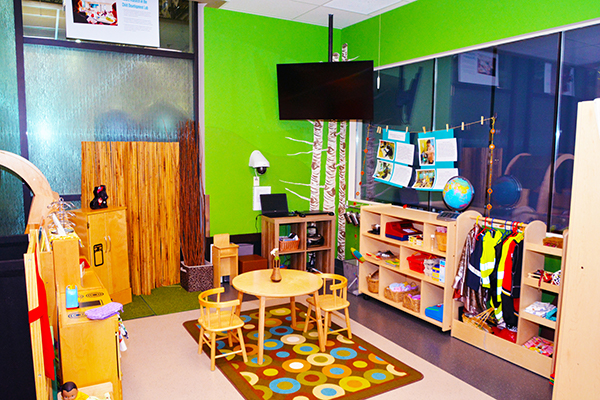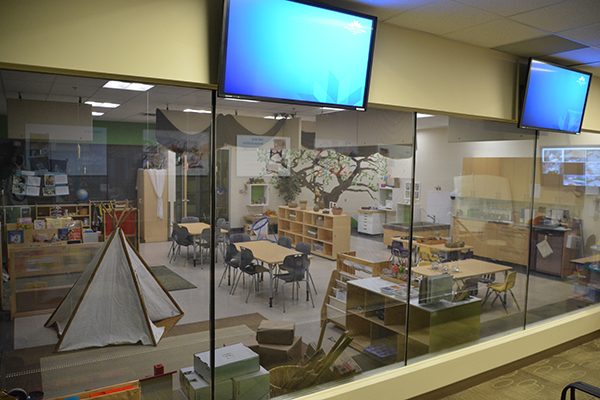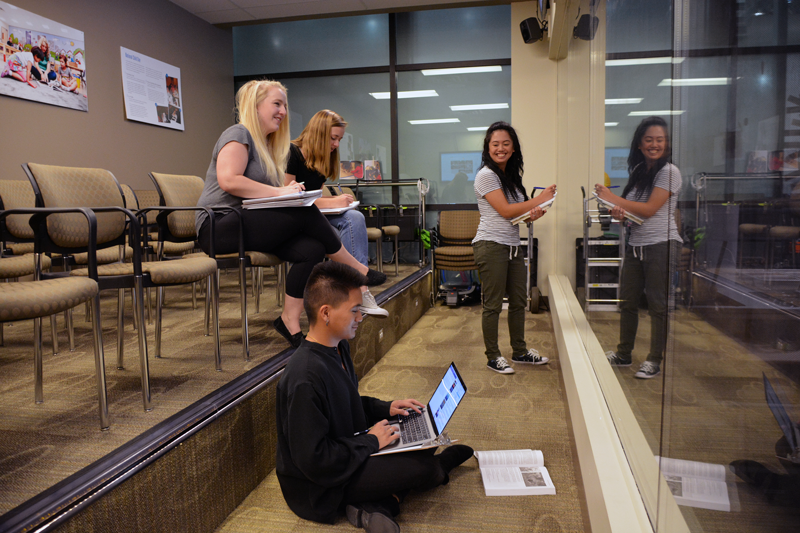Child Development Lab

The Bachelor of Child Studies (BCST) offers a progressive approach to studies that focuses on children and youth. Mount Royal University's distinctive program emphasizes experiential learning in early learning and child and youth care.
Experiential learning is an essential component of the BCST. The Child Development Lab (CDL) is a vibrant experiential learning space where students and faculty can explore the child/youth setting. Through simulation and experiential learning, students can practice in a way that allows them to observe, reflect and develop their skills and theoretical knowledge.
The 30' by 30' lab is furnished with a variety of traditional early learning play materials and expressive and creative art supplies and facilitates flexible seating for 25 adults or children. This space is equipped with four zooms and 'eye in the sky' cameras and 16 microphones that allow the capture of video and sound within all areas of the room.
A wall-length observation room located adjacent to the lab seats 25 comfortably and offers three viewing monitors, sound access to the lab, a fully equipped teaching cabinet and an attached editing suite that is video-capable. This space can be used to observe and record lab activity or as a full independent teaching and learning space. To learn more about the technology, watch this video.



For further information about the lab or to discuss rental needs, please contact:
Hina Arshad
Lab Coordinator
Phone: 403.440.6776
Email: harshad@mtroyal.ca
Resource Hub
The Child and Youth Care Association of Alberta works to improve professional standards for Child and Youth Care Counselors by providing support, education and opportunities to enhance skills and abilities, ensuring that children, youth and families receive the highest quality of care.
Alberta College of Social Workers is a group of social workers connected through a commitment to professionalism, advocacy and social justice. Together, we represent, strengthen and promote the social work profession and fulfill the regulatory requirements of the Health Professions Act.
- Building Your Child's Brain is Like Building a House
- Build Your Child's Brain By Giving Them Lots of Experiences to Explore
- Building Your Child's Brain Through Physical Literacy
- Active Play Experiences Help Children Develop Physical Literacy
- Relationships and Building a Child's Brain
- Active Play for Preschoolers
Finding Community Supports in Calgary — a visual directory/resource
My Child's Learning: A parent's resource that will provide parents with a better understanding of Alberta's curriculum and related information for their child. This tool can help you discover what your child is learning, how they're assessed and what resources are available to help them be successful from Kindergarten to Grade 12.
The Government of Alberta has a variety of tools and resources for parents and families.
Recommended books for Parents and Families
Family Websites and Online Resources — a directory
The International Child and Youth Care Network (CYC-Net) is a registered non-profit and public benefit organization. Its main objectives are (primarily through the internet and electronic media) — "to promote and facilitate reading, learning, information sharing, discussion, networking, support and accountable practice amongst all who work with children, youth and families.
Play, Participation, and Possibilities is the Early Learning and Child Care Curriculum for Alberta and is the result of an intense and exciting two-year collaboration among early learning and child care educators, early childhood academics, government, and professionals working in related fields.
On diversity:
Harvard University's Center on the Developing Child was founded in 2006. The Center catalyzes local, national, and international innovation in policy and practice focused on children and families. They design, test, and implement these ideas in collaboration with a broad network of research, practice, policy, community, and philanthropic leaders.
Start Smart, Stay Safe is an initiative to help strengthen children, families and communities and, in the long term, decrease victimization and youth involvement in criminal activities.

